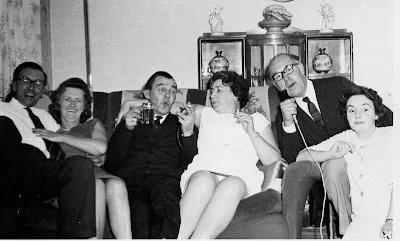I think we all do.
Grandparents, friends, colleagues, actors.......Auntie Gladys!...there are always some charismatic characters that spark the interest and tweak the admiration.
On the surface, one of my heroes, looks a little........ unlikely.
She was a lumpy,somewhat austere looking lady in her mid fifties.by the name of Margaret Dryburgh
and she died in 1945
I first "got to know" Margaret after reading two accounts of the internment of European and other national civilians after the Fall of Singapore by the advancing Japanese.
The first book White Coolies by Betty Jeffrey,gave a somewhat harrowing account of the occupation from the Australian Nurses perspective while the more comprehensive Women Beyond The Wire by Lavinia Warner and John Stanilands chronicled the plight of all of the internees in Sumatra during the war.
(John D will, I am sure have more information on this subject)
 |
| A somewhat lurid 1950's paperback illustration of an extraordinary story |
The daughter of a Sunderland minister, Margaret trained as a teacher and then a nurse before embarking on Presbyterian missionary work in the far east by the early 1920s.
She was captured by the Japanese as she joined the Singapore exodus of civilians by sea and was interned in a series of prisoner of war camps for the duration of the war.
Very quickly, and with a quiet determination Dryburgh was instrumental in providing a morale boosting influence on her fellow camp mates. She organised camp reviews, poetry readings, adult and child education, hymn singing, and designed and wrote a weekly camp newspaper which she illustrated herself with cartoons and drawings.
She also teamed up with professional musician Norah Chambers to organise a camp choir, where she was responsible for writing all of the music down from memory. The choir effectively "sang" as instruments..and would tackle complicated orchestral pieces ranging from Handle, Bach and Beethoven which impressive skill.
In 1996, Paradise Road, a film which tells the story of the Women's Choir was released with Glen Close playing the Norah Chambers character and with Pauline Collins playing Margaret Dryburgh.
Dryburgh almost survived the war. She died of Dysentery in April 1945 after her camp was relocated . By that time well over half of the choir had died of illness and malnutrition, yet at Margaret's funeral, a hymn entitled The Captive's Hymn, was sung by the remaining singers, a hymn that Margaret had written herself.
Margaret's story, for me was inspirational,
She is a shining example how the skills one can develop can be channelled into a force for good when backed up by some Bulldog spirit and a good heart.










.jpg)

